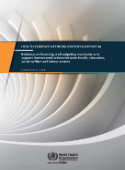Evidence on financing and budgeting mechanisms to support intersectoral actions between health, education, social welfare and labour sectors (2016)

Download
By David McDaid and A-La Park
Health Evidence Network synthesis report 48
2016, x + 49 pages
ISBN 978 92 890 5192 7
Intersectoral collaboration between the health and the social welfare, education or labour sectors can help to influence the social determinants of health. Funding such collaboration can be difficult as these sectors may be subject to very different regulatory structures, incentives and goals. This review found 51 documents on the use of various financial mechanisms to facilitate intersectoral collaboration for health promotion, involving at least two of these sectors.
A systematic search of the evidence identified the approaches used, including: discretionary earmarked funding, recurring delegated financing allocated to independent bodies and mechanisms for joint budgeting between two or more sectors. Many of these examples are implemented at a regional or local, rather than national, level and factors that influence their success include organizational structures, management, culture and trust. Potential facilitators include regulatory and legislative frameworks providing incentives, clear accountability for actions and the identification of specific benefits to all participating sectors.



